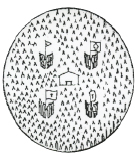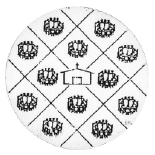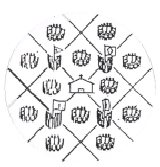SCC and Association
Associations like Vincent de Paul Society, Legion of Mary, Charismatic Renewal Groups, Youth Associations etc. have existed for many years. Some think that these are enough. They do not see the need for SCCs while others consider SCCs as another association. It is the task of the SCCs and other associations and organizations to continue the mission of Christ in their locality and make Him visible to all peoples.
1. COMPARATIVE REFLECTIONS
What have you to say about the state of parishes with the three different situations given below
 |
 |
 |
|
Associations |
Small Christian Communities Only? |
Association and Small Communities |
|
|
|
Analyzing the above comparative chart we find:
- The SCCs decentralize and organize the parish better. This is a special function of SCCs.
- SCCs are a means for evangelization, for a more profound communion, a sign of vitality and a new hope for the church. In this way the Holy father John Paul II gives SCCs a unique and important place in the parish life.
- SCCs have a special place and role in the parish. It makes the parish more alive.
- Associations deepen ones missionary spirit and commitment.
- Both SCCs and Associations need to co-exist in the parish and work together.
2. DIFFICULTIES THAT ARISE BETWEEN SCCS AND ASSOCIATIONS
i. Problems that may arise :
a) fight for importance.
b) undue preferences or prejudices by priests, parish council.
c) overburdening of Associations with all tasks.
d) members of various groups seeing each other in polarizing way – we and you.
e) lack of co-ordination and clarification of roles.
f) division of tasks.
g) Too many meetings, often on the same day.
h) Feeling of inferiority.
ii. Reasons for problems
a) Lack of clear understanding of the church.
b) Lack of understanding about what SCCs and Associations are.
c) Power politics.
d) Absence of good leadership and formation.
e) Lack of co-ordination and guidance.
f) Priests and parish councils making preferential choices without understanding the role of each Association and SCCs.
iii. Solutions which may be helpful
a) Formation for clergy, parish council and Associations members about what SCCs, are and what Associations are and about the way they can co-exist.
b) Good and regular formation.
c) Parish council co-ordinates the functioning of these bodies, ensuring smooth functioning and co-operation.
d) Trained leadership-rotating and team leadership.
e) Openness to discuss problems and find solutions.
f) Praying together.
g) Doing some parish activities together.
h) Associations promote SCCs and vice versa.
Conclusion:
Both SCCs and Associations are important and have their own roles in building community and fulfilling the mission of the parish community. The Church teachings since Vat. II have emphasized the need of SCCs and has called them concrete expressions of the Universal Church – Miniature Churches (RM 51) – to bring about unity, participation, and parish renewal which embraces all in the neighbourhood. It is also to be recognized that many Associations have a long history of existence and service. Now the Church wants both SCCs and Associations to function as complimentary and mutually supportive bodies, enriching and strengthening the parish community.
Since each SCC is the Church in the neighbourhood it is therefore responsible for the missionary mandate of the Universal Church in their respective neighbourhoods. This mandate is the responsibility of all as the Church is by its very nature missionary (AG 2). Associations help the SCCs in fulfilling this missionary mandate and offer a more challenging form of Christian living and witnessing both at the level of the SCC and at the level of the parish. It is to be appreciated that this missionary mandate is not a case of either of the two, but the collaboration of the two: SCCs and Associations.
